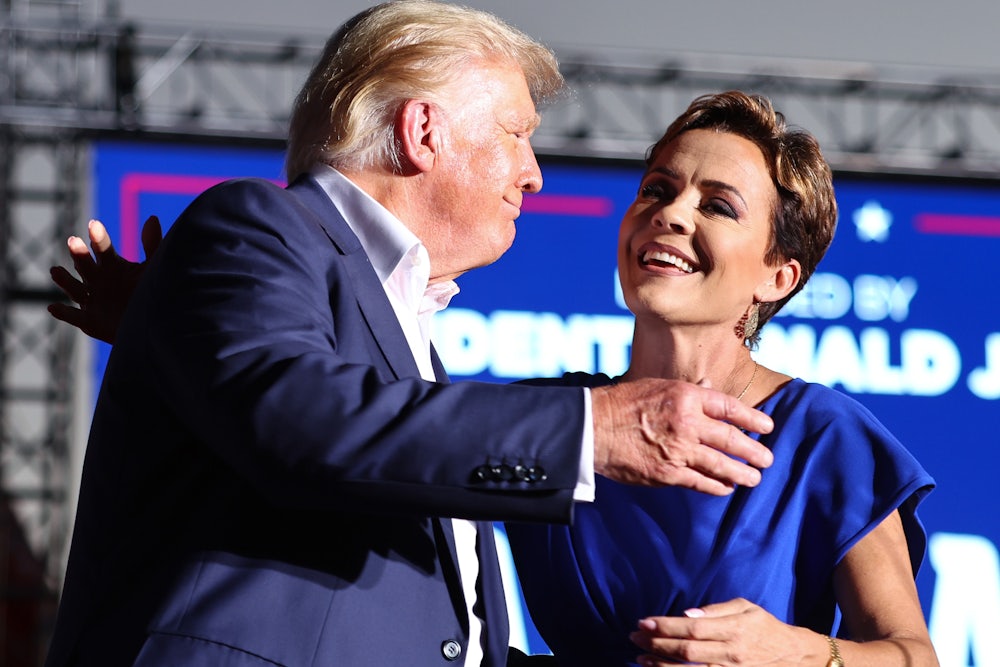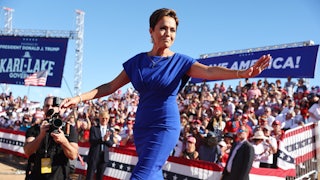“I’m going to win the election, and I will accept that result,” Arizona Republican gubernatorial candidate Kari Lake said during an interview on Sunday, when asked if she would adhere to the election results in a few weeks. When pressed further by CNN host Dana Bash, Lake repeated the same answer, word for word. Lake’s own refrain—her inability to say that she’ll accept the will of voters in her state if she loses—sums up the core of her entire campaign, and it captures one of the most destabilizing things about the 2022 midterms, the first since Donald Trump’s “Stop the Steal” led to his allies overrunning local elections offices and, eventually, the Capitol. Where once Trump was mostly an outlier in outright rejecting results that clearly showed he’d lost, it’s now become the standard plan for Lake and many of her fellow Republicans.
Win or lose in November, Lake is now synonymous with election denial. “There are election deniers, and then there’s Kari Lake,” as FiveThirtyEight pronounced in its assessment of the likelihood that the former local Fox television news anchor will beat her opponent, Katie Hobbs, the current Arizona secretary of state. (The poll-crunching website lists the race as a “toss-up,” as recent surveys have put Lake narrowly ahead, but well within margins of error.) Lake’s chances in November are uniquely boosted (and warped) by Arizona’s status as “ground zero” for election denial.
Arizona was the epicenter for “Stop the Steal,” and the conspiracy theories that erupted there are still fueling our nearly two-year-long national crisis. Weeks before the Arizona man who dubbed himself the “QAnon Shaman” (also known as Jacob Chansley) strode into the Senate chambers on January 6, 2021, he was a fixture at the Maricopa County elections office, part of the first armed demonstrations at what became the “epicenter” of the effort to overthrow the election results. “Their being there actually is causing delay and disruption,” Hobbs said at the time, in her role as secretary of state, “and preventing employees from doing their jobs.”
Eventually, though, the race was called in Biden’s favor, and the state could have returned to the relative normal of past elections, when counting ballots was a ho-hum affair, typically carried out by dutiful senior citizen volunteers. But months after Biden’s inauguration, Arizona’s state Senate ensured that “Stop the Steal” would leave a lasting legacy in the state—and the country as a whole—demanding an “audit” conducted by an outside group with zero such experience, Cyber Ninjas, whose CEO had already publicly alleged there was fraud in the 2020 election. The so-called “audit” and political theater surrounding it served as a template for similar efforts in other “battleground” states. Christina Bobb, one of Trump’s senior lawyers who was later present when federal agents searched for stolen records at Mar-a-Lago, “reported” on it all for One America News, while—as The Arizona Republic discovered—she was also fundraising for the so-called “audit.” From there she joined the failed fake elector ploy and the “command center” at the Willard Hotel on January 6.
Ten months after the election, Cyber Ninjas presented its conclusions—“a plethora of unsubstantiated allegations,” as the Arizona Mirror described its presentation, which nevertheless confirmed that Biden was the winner. Yet Arizona election officials continue to receive threats, inspired in part by the debunked “audit” and further inflamed each time a new conspiracy theory emerges, such as candidates in the 2022 primary encouraging Maricopa County voters to steal pens they say can “insert” votes (itself a reprise of 2020) or the release of Dinesh D’Souza’s 2000 Mules film with its debunked claims of “ballot harvesting.” (Lake has promoted the film.)
The group behind the film—which Lake has endorsed, and which the Special Investigations Section of the Arizona Attorney General’s Office has asked the FBI and IRS to investigate for potential violations of its nonprofit status—is called True the Vote. (Lake said she still believes the film is credible.) 2000 Mules is being used to promote “vigilantes” to surveil ballot boxes, including one group, the Lions of Liberty, which has direct connections to the Oath Keepers, a militia group whose founder is currently on trial for seditious conspiracy. “For the November election we would like to post people” at ballot boxes, said the leader of the Arizona Oath Keepers chapter, “to have eyes on target to be able to notify law enforcement.” The group claims to have already coordinated with a local sheriff, who has spoken to the Oath Keepers several times and who “told us that if we see somebody stuffing a ballot box and if we get a license plate, they will make an arrest and there will be a prosecution.” Others in Trump’s orbit have been touring the country, including Arizona, training conservative activists to volunteer as poll workers.
Lake might be especially persistent with her election claims, but she’s far from the lone election denier in her own party. There’s Blake Masters, an Arizona Republican candidate for the U.S. Senate, who has also been preparing his supporters to reject the election results should he lose. Speaking to a prospective voter on Tuesday, in response to the voter’s concern that voting machines would “flip” votes to his opponent, Masters invoked a conspiracy theory about Dominion voting machines throwing the 2020 presidential election to Biden—which, despite being knocked down remains an article of faith among Trump supporters who maintain that Trump won. (If anything, there is evidence that some Trump allies have had unauthorized access to voting machines.) Masters is one of six Arizona Republicans running for Congress who deny that Biden won in 2020, along with the Republican secretary of state candidate Mark Finchem, Republican attorney general candidate Abe Hamadeh, and 10 Republican candidates for the Arizona state legislature.
Contrary to some of the perilously understated characterizations of her “unconventional” campaign or her “say-anything bravado,” and in contrast to the candidate’s own soft-filtered home studio performances, Lake’s election denial is an appeal to an electorate consumed with a dangerous and already lethal battle. She shares this with the many other election-denying and questioning candidates across the country, including a majority of Republican nominees. Running on election denial isn’t dangerous merely because its faithful are unashamedly anti-democratic in their quest to reclaim power for Trump, but because what they seek to bring about through that fight is a white Christian nation. Lake’s specific ties with election deniers bring her directly into Christian nationalist circles. She is scheduled to join Mike Lindell in Phoenix next week, at an event put on by Flashpoint billed as “the last stop in the Take Back America Tour.” Flashpoint attracted much concern on social media when a video from an event in Georgia this summer was shared widely, featuring a dominionist pledge declaring they were “watchmen” who “had been given legal power from heaven” to ensure that Christians control the United States.
We are still reckoning with what happens when such groups—Christian nationalists, militias, and vigilantes—align around the lie of a stolen election. Still, it feels reasonable to say that it might never have led to their attack on the Capitol on January 6, if Trump hadn’t first gone up to the podium late on election night in 2020, after an introduction from what could have been a WWE announcer and the clipped strains of “Hail to the Chief,” and proclaimed the election a “fraud.” The election result was “phenomenal,” he rambled on. He said he won multiple states he in fact had lost. He singled out Arizona, one state he admitted had been called for Biden, but, he added, “that could be overturned,” before unspooling completely, declaring, lying, “Frankly, we did win this election.” Watching it again, now in light of Lake and other Republicans and what might come in the 2022 midterms, Trump’s nonconcession speech plays like a preview.


